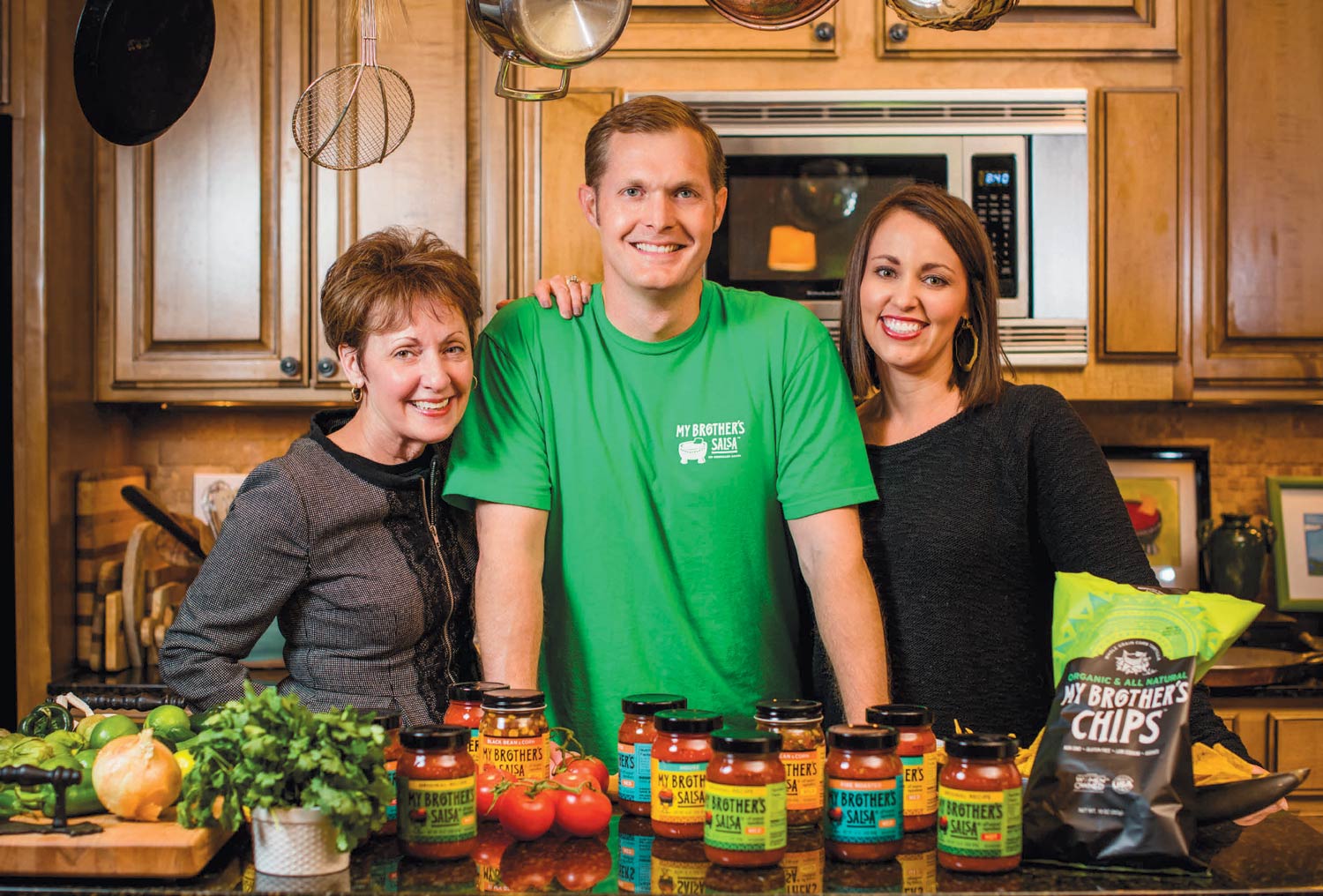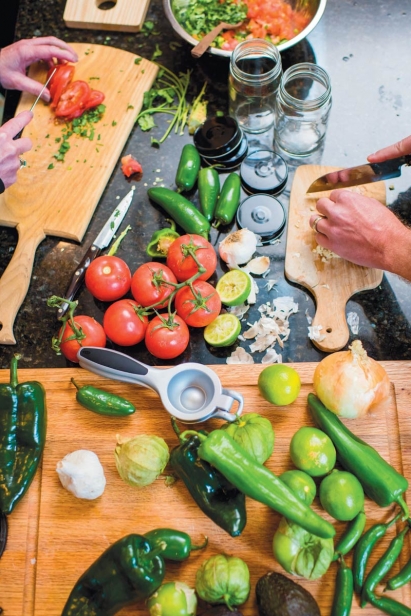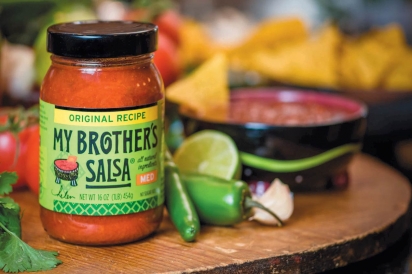Wholehearted Success
Make it delicious, and they will come.
-Helen Lampkin
For decades, ketchup was the number one condiment on store shelves. But in 1991, that all changed. There was a new jefe, or boss, in town, and its name was salsa.
Salsa–a category of products that includes several types of chili pepper-based sauces–beat out ketchup at the register by a decisive $40 million in sales that year. Food manufacturing companies finally were acting on pleas from consumers who wanted less salt and fat in their products. In order to maintain flavor, companies increasingly were turning to so-called "ethnic" seasonings.
A decade later, Helen Lampkin was a homemaker in central Arkansas who was being encouraged by her family to sell her homemade salsa that was a variation of a family recipe. Since her oldest brother passed along his recipe to her in the late 1970s, Lampkin had been tweaking it in her kitchen, and giving jars of the stuff as gifts to family and friends. "That first recipe really was from my brother," Lampkin says with a smile. "My whole family loves to cook, loves to share food, [and] gather around the table. As I gave away jars, I would say, 'Try my brother's salsa.'"
Today, My Brother's Salsa is a premium brand available at more than 2,000 stores across the country–a testament to the value of a supportive family and a vision to feed people real food. The company is run by Lampkin, her daughter Ashley Pointer, and her son-in-law Blake Pointer (pictured above)–who serve as founder, chief operating officer, and chief executive officer, respectively. Lampkin's husband, Steve, an executive at Walmart, acts as senior advisor and head cheerleader.
The epiphany
When Lampkin was a young wife, she made the decision to be a homemaker at a time when many women were leaving the house to pursue a career. "I got a lot of grief from other women about staying home," Lampkin explains. "[Homemakers] were thought of as not doing anything important or contributing to society."
But Lampkin had an epiphany related to a Bible verse she had learned that confirmed her choice. Colossians 3:23 reads, "Whatever you do, work at it wholeheartedly as though you were doing it for the Lord." As she swept her kitchen floor one afternoon, that verse came back to her; "I thought, 'Seriously, Lord? I have to sweep wholeheartedly?'" Lampkin laughs. "And the answer came back, 'Yes, wholeheartedly. It's okay that you want to stay home.' From that point forward, I felt great about it."
Over the years, the salsa that Lampkin made from her brother's recipe gained in popularity with family and friends. In 2003, after her family had moved to Northwest Arkansas, she was being encouraged by her husband and son-in-law to consider making it available to a bigger audience.
"We had been making it for years and sharing it, so I thought, 'Okay, I'll look into it.' I guess we had a vision," she says. "We knew it was something people liked because they kept coming back for it. When you know that, it gives you more confidence."
The next thing she knew, she was incorporating the name and attending Food and Drug Administration labeling classes.
Lampkin approached the food science department at the University of Arkansas, and they helped her connect with large-scale food manufacturers. During the search for a manufacturer, Lampkin's commitment to following her vision came into play again–minus the sweeping.
Keeping it fresh
As Lampkin describes it, some manufacturers encouraged her to source cheaper ingredients for her salsa to increase profits. But for Helen, there was no question of using anything in her salsa that would make it different from what she would prepare in her own kitchen.
"We want to make something high quality, and we want it to be the same at [the customer's] table as it is at our table. If we thin something down, or use different ingredients to get a better margin, the recipe isn't going to come out the same as it is at our house."
The commitment to making My Brother's Salsa with fresh ingredients is a key part of something that Lampkin likes to promote about the company's products: They help busy homemakers provide a healthy meal for their families without a lot of expensive ingredients and preparation time. Fresh produce can be difficult for some families to put on the table every day, but Lampkin thinks that replacing several vegetables with a jar of salsa provides comparable benefits.
"Using the salsa makes cooking so easy," Lampkin says. "You don't need to buy a lot of ingredients, because they are all in the jar."
That concept–that My Brother's Salsa products make healthy meals more accessible for home cooks–is rare in the market. The company backs up this promise by providing recipes online and in stores to help their customers incorporate the salsas into their meal planning.
Blake Pointer says that retailers appreciate the recipes as well, because recipes (even those that reduce ingredients) drive in-store purchases. The family has enjoyed hearing from people who have discovered their own uses for the products.
"There's the simple, and the complicated," Pointer says. "Some cooks use our products in simple ways that fit their lifestyle, and others really dress it up a lot and make an amazing meal. We love to hear about both."
Growing the brand
As with any business expansion, there were bumps in the road as they grew, but the family always pulled together as a team. In the early days of the business, Lampkin was her own delivery driver, crisscrossing the state in the family sport utility vehicle loaded with fresh batches of salsa. But when Lampkin visited the Dallas gourmet food market in the mid-2000s at the suggestion of her daughter, she decided to return as a vendor. The resulting orders from surrounding states made the personal delivery method impossible.
They set up an account with FedEx and began shipping all over the region, with all hands on deck. "The whole family helped with fulfillment," Lampkin says. "We have all done our share of labeling jars and packing boxes."
Then, 2011 brought even more growth; that was the year that Pointer left his career at Saatchi & Saatchi X to officially join the company's leadership. My Brother's Salsa also became part of the Showcase Events (then called Road Shows) with Sam's Club–a move that Pointer believes is the biggest turning point for the company so far.
They joined the Road Shows in February of that year, and the family traveled the country handing out recipe sheets and promoting their products with in-store demonstrations. The family loved meeting customers face-to-face, and the interactions provided valuable insights for their business as well.
"We were on tour, basically," Pointer explains. "We learned things [a new business owner] would never think about, things like inventory management. . . We learned so much about our infrastructure."
It was through those initial meetings with Sam's Club that the family made another important choice to stand out in the growing grocery store salsa category.
Certified women-owned
According to a survey done by Walmart in its stores, 90 percent of female customers say they would "go out of their way" to purchase products from companies that are owned by other women. Lampkin already had started the lengthy process required to be certified as being "women-owned" by the Women's Business Enterprise National Council, so during one of her meetings with Sam's Club representatives, she asked specifically if it would be beneficial to the company for them to finish that process.
"They told me if there are two salsas in front of them that are equal in every way, and one is certified, they would go with the certified business." She went home from the meeting and completed the paperwork.
Once the paperwork was submitted, a site visit had to be scheduled, to verify that the business was actually a business. "My first site visit was in the laundry room in my home," Lampkin says, laughing. "I asked if that was going to be a negative for me, and they said they do it all the time."
Simply speaking, My Brother's Salsa was not founded because the Lampkin family wanted to own a successful company, but out of a homemaker's desire to share good food with her community. Selling salsa is just an extension of Lampkin's passion for feeding others by sharing family recipes with more people than she was able to cook for in her own kitchen. It makes sense, then, that her family is passionate about being involved with nonprofit organizations, such as the Arkansas Hunger Relief Alliance and the Northwest Arkansas Food Bank, that are working in their community to address hunger issues.
"I really do think that our company can make a difference in people's lives," Lampkin says. "It's not a company just to be a company. It's more about creating a legacy–not leaving a legacy, but creating a legacy, asking ourselves, 'What can we create that other people can come and be a part of?'"







